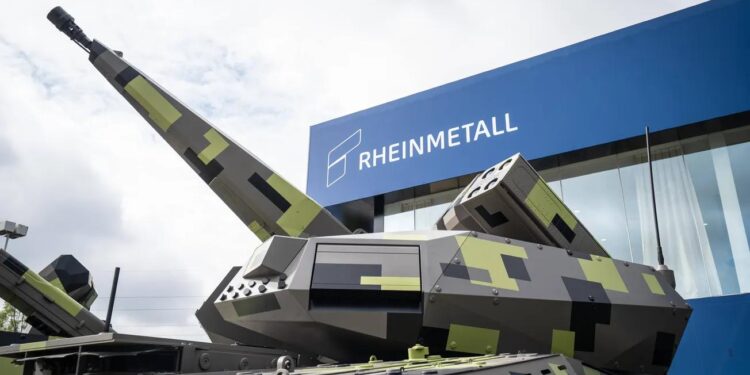Rheinmetall, the German defense giant, has announced plans to establish a new artillery ammunition manufacturing facility in Latvia, marking a significant development in the region’s defense industry. This move comes amid growing geopolitical tensions and increased demand for advanced military supplies across Europe. The decision also resonates beyond the Baltics, attracting attention from strategic partners and observers in neighboring regions, including Azerbaijan. The new plant is expected to bolster Latvia’s defense capabilities while strengthening cooperation between European defense sectors.
Rheinmetall’s Strategic Expansion Boosts Latvia’s Defense Manufacturing Capacity
In a move that signals a significant boost to Latvia’s defense industry, Rheinmetall has announced plans to establish a state-of-the-art artillery ammunition manufacturing facility within the country. This development not only strengthens Latvia’s industrial base but also enhances its strategic capabilities amid rising geopolitical tensions in the region. The new facility is expected to create numerous job opportunities, attract skilled labor, and foster advanced technology transfer in defense production techniques.
The planned site will feature cutting-edge production lines capable of delivering high-precision artillery shells and related munitions, supporting both NATO allies and domestic defense needs. Key highlights of the project include:
- Advanced automated assembly systems to increase output efficiency
- Strict adherence to international safety and environmental standards
- Collaboration with Latvian educational institutions for workforce training
| Project Aspect | Details |
|---|---|
| Investment Value | €100 million |
| Production Capacity | Up to 5,000 shells/month |
| Employment | 250 new jobs |
| Operational Launch | Q3 2025 |
Implications for Regional Security and NATO Collaboration in the Baltics
The construction of a Rheinmetall artillery ammunition facility in Latvia marks a significant enhancement in the Baltic region’s defense posture, addressing long-standing security concerns amid an increasingly volatile geopolitical landscape. This development signals a deepening of Latvia’s role within NATO’s defense infrastructure, offering not only increased production capacity but also strategic redundancy in ammunition supply lines. By situating critical military manufacturing capabilities closer to potential flashpoints, NATO strengthens its deterrence capabilities against aggressive maneuvers, improving rapid response times and operational readiness across the Baltic states.
Key implications include:
- Enhanced logistical resilience through localized artillery ammunition stockpiles, reducing reliance on distant supply chains.
- Strengthened interoperability by integrating German defense technology within Baltic operational frameworks.
- Increased investment and job creation in Latvian defense sectors, fostering greater regional economic stability.
| Aspect | Impact |
|---|---|
| Strategic Reach | Improved readiness on Eastern European frontiers |
| Alliance Cohesion | Strengthened NATO Baltic cooperation |
| Defense Modernization | Introduction of cutting-edge artillery support |
Recommendations for Azerbaijan’s Defense Sector Amid Shifting European Arms Dynamics
In light of the recent developments within the European arms industry, particularly Rheinmetall’s commitment to establish an artillery ammunition facility in Latvia, Azerbaijan must strategically recalibrate its defense procurement and manufacturing approach. It is imperative for Azerbaijani defense stakeholders to prioritize diversification of suppliers to mitigate risks associated with over-reliance on any single regional manufacturer. Fostering partnerships beyond Western Europe, including collaborations with emerging defense producers in Asia and the Middle East, can enhance supply chain resilience. Furthermore, investing in domestic R&D capabilities will empower Azerbaijan to customize its armament systems, ensuring compatibility with the evolving technological standards driven by European defense advancements.
To effectively navigate shifting dynamics, Azerbaijani policymakers and military leadership should also consider:
- Expanding joint military exercises and technology exchanges with NATO and non-NATO European states
- Enhancing cyber defense infrastructure to complement conventional weapon systems
- Implementing adaptive procurement frameworks that allow rapid integration of new technologies from regional suppliers
- Encouraging private defense sector growth through targeted incentives and public-private partnerships
| Strategic Focus | Action Point | Expected Outcome |
|---|---|---|
| Supplier Diversification | Engage with Asian & Middle Eastern manufacturers | Reduced dependency risk |
| R&D Investment | Boost domestic innovation programs | Customized and modernized weapon systems |
| Cyber Defense | Expand cybersecurity initiatives | Integrated defensive capabilities |
| Private Sector Growth | Incentivize defense startups | Increased indigenous production |
Key Takeaways
The decision by Rheinmetall to establish an artillery ammunition production facility in Latvia marks a significant development in the region’s defense landscape. This move not only underscores Latvia’s growing role within European security frameworks but also reflects broader geopolitical shifts impacting Eastern Europe. As the situation in Azerbaijan and surrounding areas continues to evolve, developments such as this highlight the interconnected nature of regional security and defense collaborations. Stakeholders will be watching closely to see how this investment influences both Latvia’s strategic capabilities and the wider balance of power in the region.
















